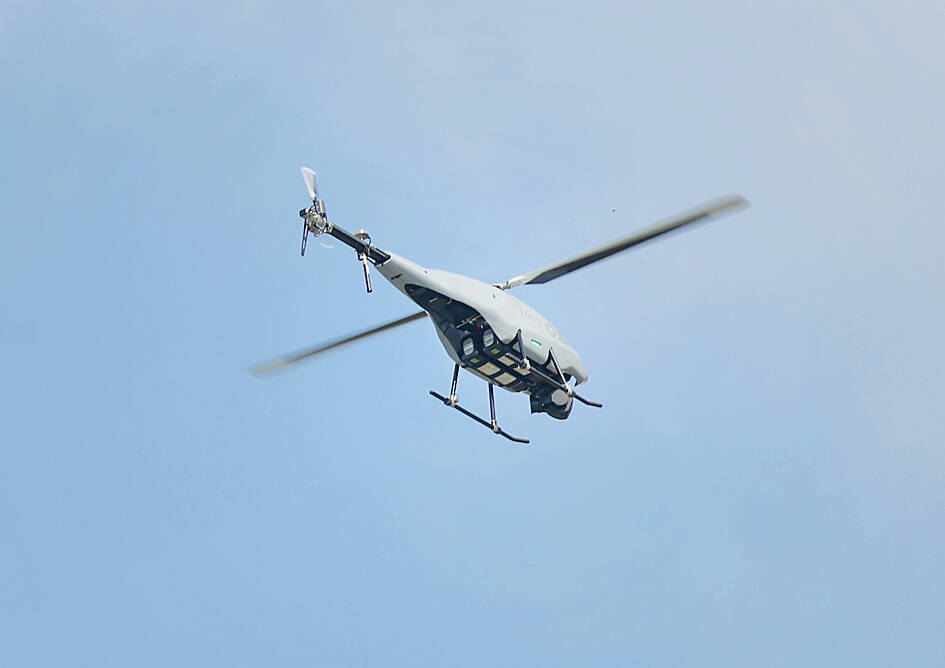A cross-agency task force created to select a team of uncrewed aerial vehicle (UAV) manufacturers yesterday said a national UAV fleet could be established administratively in the latter half of the year after it picks the lead manufacturer for the program this month.
About 3,000 UAVs are to be used for military purposes despite not being made to military specifications, and are expected to be delivered to the military by next year, the task force said.
The UAVs would primarily provide support or be used in field operations, it said.

Photo: CNA
Taiwan has been focused on developing its aerospace industry, under the broader “five plus two” innovative industries and “six core strategic industries” policies.
“Five plus two” refers to plans to develop an “Asian Silicon Valley,” biotechnology, green energy, smart machinery and defense, as well as innovative agriculture and the circular economy.
The six core strategic industries are information technology, cybersecurity, precision health, renewable energy, national defense and strategic stockpiling.
The Ministry of Economic Affairs said nine firms have been reviewed, and by July are expected to produce prototypes for shipborne reconnaissance, land-based reconnaissance and general reconnaissance, as well as prototypes of miniature drones and drones with target-acquisition capabilities.
The Ministry of National Defense is set to launch a limited bidding period in August to select prototypes, the task force said.
Active and passive radars and drone-interference systems have been selected, but the manufacturers for those would not be chosen until after the Lunar New Year, the economic affairs ministry said.
The government is considering the possibility of having the Chungshan Institute of Science and Technology (CSIST) transfer its defensive technologies to manufacturers.
Interested parties must provide proof that China-based companies do not fund them and they do not have shares in China-based firms, and pledge not to use products or components manufactured in China or by Chinese firms, the defense ministry said, adding that they would also be required to sign a nondisclosure agreement.
The task force comprises officials from the National Science and Technology Council, the CSIST, and the defense and economic affairs ministries.

MAKING WAVES: China’s maritime militia could become a nontraditional threat in war, clogging up shipping lanes to prevent US or Japanese intervention, a report said About 1,900 Chinese ships flying flags of convenience and fishing vessels that participated in China’s military exercises around Taiwan last month and in January have been listed for monitoring, Coast Guard Administration (CGA) Deputy Director-General Hsieh Ching-chin (謝慶欽) said yesterday. Following amendments to the Commercial Port Act (商港法) and the Law of Ships (船舶法) last month, the CGA can designate possible berthing areas or deny ports of call for vessels suspected of loitering around areas where undersea cables can be accessed, Oceans Affairs Council Minister Kuan Bi-ling (管碧玲) said. The list of suspected ships, originally 300, had risen to about 1,900 as

Japan’s strategic alliance with the US would collapse if Tokyo were to turn away from a conflict in Taiwan, Japanese Prime Minister Sanae Takaichi said yesterday, but distanced herself from previous comments that suggested a possible military response in such an event. Takaichi expressed her latest views on a nationally broadcast TV program late on Monday, where an opposition party leader criticized her for igniting tensions with China with the earlier remarks. Ties between Japan and China have sunk to the worst level in years after Takaichi said in November that a hypothetical Chinese attack on Taiwan could bring about a Japanese

MORE RESPONSIBILITY: Draftees would be expected to fight alongside professional soldiers, likely requiring the transformation of some training brigades into combat units The armed forces are to start incorporating new conscripts into combined arms brigades this year to enhance combat readiness, the Executive Yuan’s latest policy report said. The new policy would affect Taiwanese men entering the military for their compulsory service, which was extended to one year under reforms by then-president Tsai Ing-wen (蔡英文) in 2022. The conscripts would be trained to operate machine guns, uncrewed aerial vehicles, anti-tank guided missile launchers and Stinger air defense systems, the report said, adding that the basic training would be lengthened to eight weeks. After basic training, conscripts would be sorted into infantry battalions that would take

DEEP-STRIKE CAPABILITY: The scenario simulated a PLA drill that turned into an assault on Taiwan’s critical infrastructure, with the launchers providing fire support Taiwan yesterday conducted this year’s first military exercises at Longsiang Base in Taichung, demonstrating the newly acquired High Mobility Artillery Rocket System’s (HIMARS) ability to provide fire support and deep-strike capabilities. The scenario simulated an attack on Penghu County, with HIMARS trucks immediately rolling into designated launch areas and firing barrages at the Wangan (望安) and Cimei (七美) islands, simulating the provision of fire support against invading forces. The HIMARS are supposed to “fire and leave,” which would significantly increase personnel and equipment survivability, a military official said. The drill simulated an exercise launched by the Chinese People’s Liberation Army (PLA) Eastern